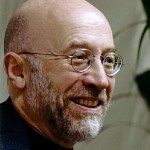What I Learned from Tony Judt
 When I first met Tony Judt, I knew nothing of his world renown as a historian, nor his criticisms of Israel and U.S. foreign policy.
When I first met Tony Judt, I knew nothing of his world renown as a historian, nor his criticisms of Israel and U.S. foreign policy.
Tony Judt sort of stumbled into the room upon our first encounter, a sort of baffled expression contorting his face. “What class is this?” he asked, clutching a tumbling stack of handouts. The answer to his question was “Cinema and Europe Since World War II”, an honors seminar I’d chosen as an elective due to my love of film. I knew nothing of the reputation of the course’s instructor, having never heard the name over the course of my then-20 years. I knew nothing of his world renown as a historian, nor of his apostasy as a critic of Israel and U.S. foreign policy. I knew nothing of the book he’d authored, Postwar, which was currently ranked by The New York Times among bestselling nonfiction, nor of his appearance that week on Charlie Rose to promote it.
No, my first instinct upon the sight and sound of him was to chuckle. Here was the very embodiment of the befuddled British pedagogue; the sort of man whose phrasing would be inherently humorous, and whose lectures would yield the sort of anecdotes you recount to friends because things he said were just funny. For example, he one referred thusly to Hugh Grant: “Who’s that awful character that’s always in ‘Four Weddings and a something-or-other’?”
Once his weekly lectures were underway, however, it was another story altogether. We simply sat, rapt, as without notes his mind unspooled. The man simply lived, breathed and taught history. The politics of the day were left at the door, petty and inconsequential. While I generally perched on the ideological defensive inside the aggressively liberal classrooms of NYU, here the thought was simply never entertained. To consider this man to be liberal or conservative was beside the point.
That’s not to say my experience of the man was unmarred. After I’d unexpectedly missed a lecture, he sent me a terse e-mail making clear the terms of enrollment: Show up, or drop out. Once, upon asking a question through which I thought I’d concealed my failure to do the week’s readings, he humored me with a detailed and informative discourse before adding, “Which of course you’d know, if you’d read the book.” Such were minor hiccups, however. During office hours, he’d entertain my elementary musings. Still not fully aware of his academic stature, I labored under the delusion of impressing with my knowledge of cinematic history as he nodded good-naturedly. In microcosm, it served as a touchstone moment for how little I knew, and how unaware I was of how much I didn’t know.
It was nearly a full year later that I got a sense of just how polarizing a figure I’d encountered. Upon speaking with a Middle Eastern studies major whose passion was the defense of Israel, I was asked, “Do you know Tony Judt?” When I answered in the affirmative, I was met with a face of sour contortion. It was only then that I did even cursory research, that I discovered his numerous lectures on the fallacy of the Jewish homeland, his New York Times op-ed excoriating the United States over the Iraq War. Until that point in my life, I’d largely subscribed to the Rush Limbaugh school of politics; the more incendiary the rhetoric against those with whom you disagree, the better. Here I’d been duped by a bona fide avatar of the far left, a radical and an apostate.
Yet upon discovering the man behind the curtain, my thoughts turned inward. Perhaps I need not seek a means to discredit all that I’d learned from Mr. Judt, but instead approach my own beliefs with increased academic rigor. I could not, even in retrospect, regard my former professor with any sense of diminished respect. Instead, his beliefs were a challenge, a call to those with whom he would disagree to fight those battles with equal learnedness. Tony Judt shared history with generosity and kindness, never demanding political or philosophical accord. For me to stop listening would not have been his loss.
In the wake of Mr. Judt’s death last Friday, it was this that I thought of, the desire to listen even amidst disagreement. It is perhaps this that seems to be lacking most of all in our current discourse. On my final day in class with Mr. Judt, a party with pizza and beer was held to celebrate. He declared: “Someone has brought to my attention that some of you may not be of drinking age. But as far as I’m concerned, you’re not drinking, that’s not beer, and that certainly isn’t a bottle-opener on the table.” I didn’t agree with a word of his politics, but to that, I listened.